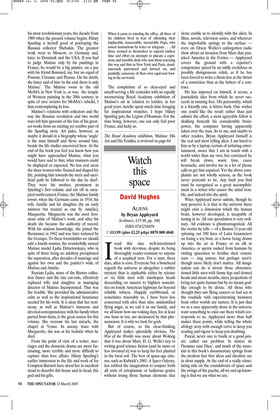Watch this space
David Hughes
ALIENS by Bryan Appleyard Scribners, £15.99, pp. 340, ISBN 0743256859 ✆ £13.99 (plus £2.25 p&p) 0870 800 4848 Iread this nice well-intentioned book with devotion, despite its being thoroughly reader-resistant to anyone of a sceptical turn. For a start, these days, alien is corn. Everyone but a bonehead regards the universe as altogether a subtler mystery than is explicable either by science or via little men with misshapen heads descending on saucers to frighten nonentities on lonely American highways far beyond reliable witness. Happily earthbound, or sometimes miserably so, I have been less concerned with ufos than ufas: unidentified flying angst, as we call it in our family, and we all know how our waking days, for at least one hour in ten, are decimated by that phenomenon. It is why we look for gods.
But of course, as the clear-thinking Appleyard makes splendidly obvious, The War of the Worlds was more about Woking that it was about Mars; H. G. Wells’s key to writing good science fiction (and he more or less invented it) was to keep his feet planted in the local soil. The best of space-age cinema, such as Kubrick’s 2001: A Space Odyssey, has rubbed the imagination to conjure forth all sorts of ectoplasmic or ludicrous genies without losing those human elements that alone enable us to identify with the alien. In films, novels, television series, and wherever the improbable springs to the surface even on Orson Welles’s unforgotten radio show about an invasion from Mars that panicked America in the Forties — Appleyard covers the ground with a reporter’s competence spiced by an oddly credulous or possibly disingenuous relish, as if he has been forced to write a thesis less at the thrust of a conviction than at the behest of a contract.
He has imposed on himself, it seems, a journalistic idea from which he never succeeds in running free. His personality, which is a friendly one, is bitten back. One wishes one could like the result rather than just admire the effort; a most agreeable fellow is skulking beneath his considerable brainpower, the computer having apparently taken over the man. So to me, and maybe to other readers, Bryan Appleyard himself is the real and most telling alien. I am lured to him as by a laptop, certain of irritating entertainment, aware that I am in touch with a world wider than my own, but convinced he will break down, waste time, cause heartache, and involve me in a lot of phone calls to get him repaired. Yet the above complaints are not wholly serious, as the book never pretends to be. Any fault you find must be recognised as a great accomplishment in a writer who causes the mind trouble, and indeed stirs the spirit.
What Appleyard never admits, though he may perceive it, is that in the universe there might exist a dimension which the human brain, however developed, is incapable of tuning in to. All our speculation is very ordinary. All evidence is phantasmagorical. All the stories he tells — of a Boston 11-year-old spinning out 100 lines of Latin hexameters on losing a toy boat, or a horse being drawn up into the air in France or an elk in America, or sperm sucked from humans by visiting spacemen to fertilise their remote stars — ring untrue; but perhaps aren’t; though more likely don’t matter. All imagination can do is invent those aforementioned little men with funny legs and domed heads and mean mouths, mere projections of being not quite human but by no means godlike enough to be divine. All those who thought they saw flying saucers or had sex at the roadside with experimenting monsters from other worlds are nutters. It is just that we as a race apparently alone in the universe want something to exist out there which corresponds to us. Appleyard more than half makes these points, while telling the whole ufology story with enough verve to keep you reading and vigour to keep you doubting.
Pascal, never one to baulk at a good pensée, called our problem ‘la misère de l’homme sans Dieu’, and much of the material in this book’s documentary springs from the modern fact that ideas and idealism are in short supply. At the end of a really stimulating ride on the roundabouts of space and the swings of the psyche, all we end up knowing is that we are what we are.
































































 Previous page
Previous page